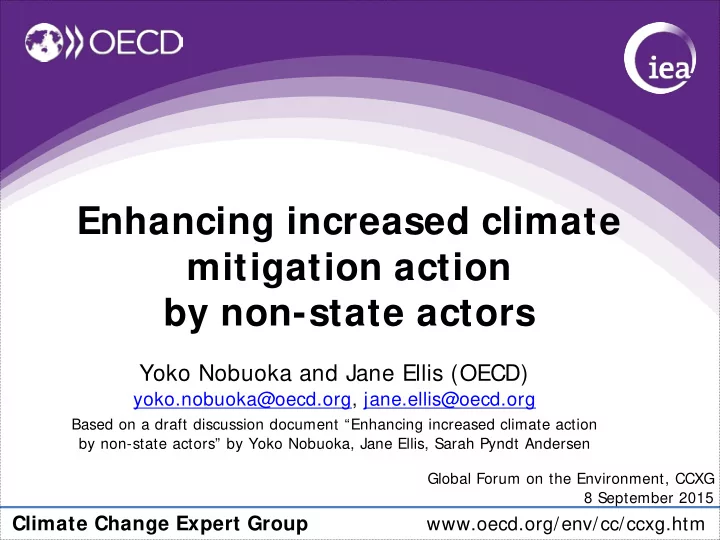

Enhancing increased climate mitigation action by non-state actors Yoko Nobuoka and Jane Ellis (OECD) yoko.nobuoka@oecd.org, jane.ellis@oecd.org Based on a draft discussion document “Enhancing increased climate action by non-state actors” by Yoko Nobuoka, Jane Ellis, Sarah Pyndt Andersen Global Forum on the Environment, CCXG 8 September 2015 Climate Change Expert Group www.oecd.org/env/cc/ccxg.htm
Presentation outline Overview of current experience and barriers encountered by non-state actors (NSAs) o Focus on sub-national governments, the private sector and financial institutions How 2015 agreement and COP decisions can help to enhance NSA action for pre and post-2020 periods Conclusions Discussion questions Climate Change Expert Group 2
Current experience with and barriers to NSA action Various barriers to NSA: 1)national policy misalignments, 2)mandate, 3)financial, 4)information and knowledge, 5)capacity and skills Some progress in enhancing NSA action: 3) & 4) barriers partially addressed via.. o Technical Expert Meetings (workstream 2 under ADP) o NAZCA portal o Financial Mechanism (GEF, GCF) o Outside UNFCCC … but limited results to date o Other barriers cannot directly be tackled by the UNFCCC Climate Change Expert Group 3
Links between UNFCCC and NSAs Mostly limited and indirect, via national governments National (no direct link) gov’t Local/ Multi-governance (no direct link) regional initiatives (e.g. CCAC) gov’t Supra-national groupings of sub-national gov’t UNFCCC Multilateral (e.g. ICLEI) financiers (no direct link) (some links via Regional, Financial Business national or sub- Mechanism) and national industry financiers (no direct link) Climate Change Expert Group 4
Enhancing NSA action Top-down vs bottom-up (autonomous at sub-national gov’t and private sector level); autonomous vs additional Bottom-up actions can catalyse action on a larger scale UNFCCC could encourage co-operation and co-ordination between national gov’t and NSAs National governments UNFCCC Regional Regional governments governments Local Local Local gov’t gov’t gov’t Climate Change Expert Group 5
What can a COP decision on WS2 do for pre-2020 ambition? Continue technical examination; enhance FM and co- ordination between Technology Mechanism and the technical examination Explicitly encourage co-operation between national governments and NSAs in development of ambitious and achievable climate responses Mention enhanced identification and dissemination of knowledge and experiences from NSAs Climate Change Expert Group 6
How can 2015 agreement enhance NSA action for post-2020? Enhance or reiterate the need for a long-term goal indirectly reducing national policy barriers Include text that recognises the role of NSAs sending political signal to motivate NSAs Continue to enhance information and knowledge sharing Encourage use of a common accounting and reporting tool to increase transparency of NSA action Reduce financial barriers (amount, access) Climate Change Expert Group 7
Conclusions NSAs face barriers to enhance climate action UNFCCC process and institutions increasingly addressing some of these Autonomous NSA action can catalyse action on a larger scale, and therefore help to raise ambition Transparency, recognition of NSA actions currently unclear Further encouragement of NSA action possible and desirable – both in 2015 agreement and for pre-2020 action, e.g. o Explicit mention of the role of NSA in financing and implementing mitigation actions o Including text that encourages enhanced links and knowledge-sharing between governments and NSA Climate Change Expert Group 8
Thank you! For more information: www.oecd.org/env/cc/ccxg.htm Climate Change Expert Group 9
Discussion questions How can the UNFCCC help NSAs address various barriers and encourage their increased climate actions? What provisions are needed in the 2015 agreement or COP decisions to do so? Climate Change Expert Group 10
Recommend
More recommend